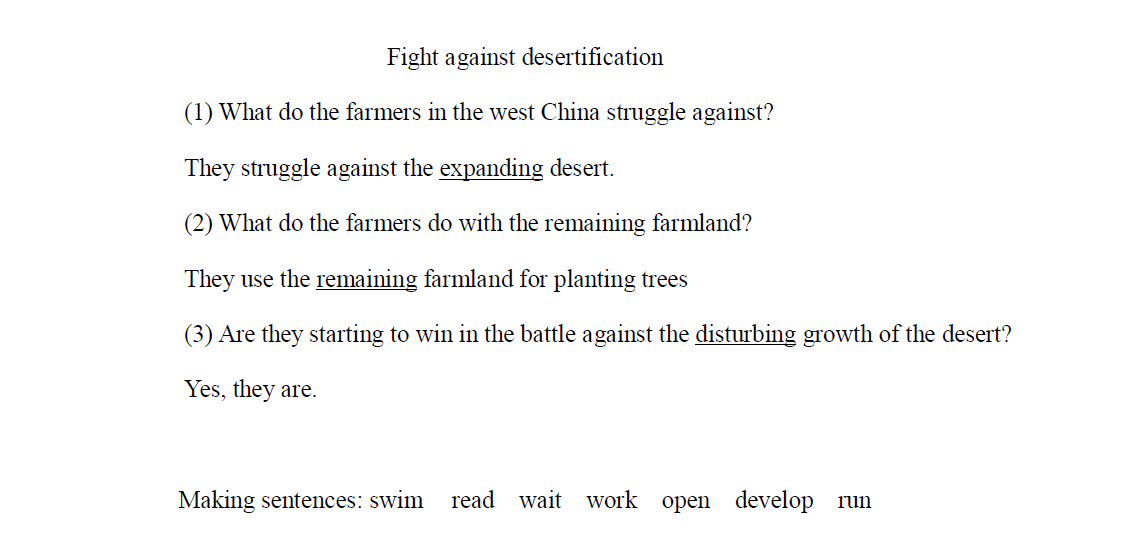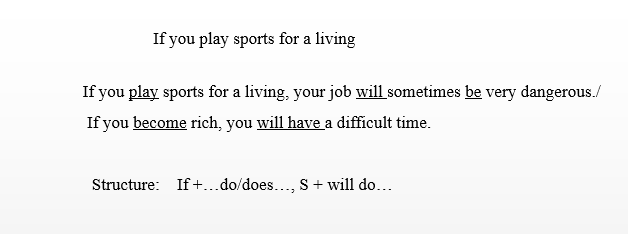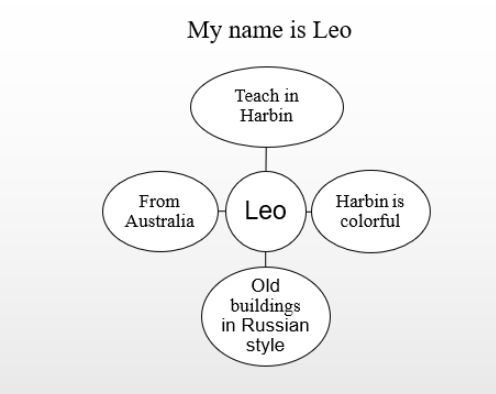1.题目:语法教学试讲
2.内容:
In the past decade, some of the farmers in the west of China have met with some success in the struggle against the expanding desert. They have been able to use less farmland than in the past. Their output of crops, however, is still the same, which makes it possible for them to use the remaining farmland for planting trees. They are starting to win small battles in the great war against the disturbing growth of the desert.
3.基本要求:
(1)朗读所给段落;
(2)配合教学内容适当板书;
(3)针对划线部分的动词-ing形式,设计相应的语法呈现与操练教学活动;
(4)用英文试讲;
(5)试讲时间:10分钟。
【试题解析】
Teaching Procedure:
I. Lead-in
Show students a video of serious desertification in China and ask students to talk about their feelings after watching.
II. Presentation
1. Play the tape for the students and ask students what the passage is about.
2. Students listen to the tape again and they to answer the following questions:
(1) What do the farmers in the west China struggle against?
(2) What do the farmers do with the remaining farmland?
(3) Are they starting to win in the battle against the disturbing growth of the desert?
3. Show students the passage, ask students to listen to the tape for the third time and check their answers. Meanwhile, pay attention to the v-ing structures used before nouns in the passage. Students underline these structures in the passage and the teacher explains their adjective usage.
III. Practice
(1) Show a short passage on the screen. Students fill in the blanks with the correct form of the words given.
He asked an ______ (embarrass) question. His mother was watching TV in the ______ (live) room, while his father was taking care of the ______ (sleep) sister. The ______ (remain) food was in the refrigerator. No one wanted to make the dinner.
(2) Provide the following words for the students and ask them to make sentences with the v-ing forms of these words.
swim read wait work open develop run
IV. Consolidation
Four students a group, discuss about the solutions that they can come up with to deal with the desertification in China. List their solutions and later the teacher asks several groups to share.
V. Summary
Students summarize what they have learnt in this lesson and the usage of v-ing structure, and the teacher gives supplement if necessary, and reminds them the importance of protecting the environment.
VI. Homework
Students surf the Internet for more information of desertification around the world.
板书设计:

1.题目:语法教学试讲
2.内容:
If you play sports for a living, your job will sometimes be very dangerous. Many professional athletes get injured. And if you become rich, you will have a difficult time knowing who your real friends are. In fact, many famous people complain that they are not happy. They say they were happier before they became rich and famous.
3.基本要求:
(1)朗读所给段落。
(2)配合教学内容适当板书。
(3)针对段落中的划线部分,设计相关的运用性练习活动。
(4)用英语试讲。
(5)试讲时间:10分钟。
【试题解析】
Teaching procedure:
I. Warming up
Play an English song: If you are happy. Students enjoy the lyrics and answer the question: If you are happy, what will you do?
II. Presentation
1. Students read the paragraph and write down the underlined sentences: If you play sports for a living, your job will sometimes be very dangerous./ If you become rich, you will have a difficult time.
2. Students discuss with group members about the structure of the two sentences, and summarize the structure: “If…, … will…”. Students are encouraged to find the similarities between the sentences.
3. The teacher teachers that the first conditional adverbial clauses use simple present tense while the main sentences normally use simple future tense.
III. Practice
1. The teacher presents different sentences with “if”, students try to choose the right tense for each sentences.
2. The teacher shows different pictures for reference and invites students to make some sentences in the form of “If …, …will…”. Then present the sentences on the screen. For example, If I have wings, I will fly high in the sky./ If he has a lot of money, he will go abroad to travel.
IV. Consolidation
Task: chain game
Students are divided into several groups. They are supposed to make a story in chain game using the sentences with “if”. The first one creates a scene, he may say: “I’m going to a nature park on Sunday.” The next one can say: “If I go to the park, I will go through the cultural part.” Then in turn, students make sentences in this way. The more sentences the group make, the winner will be.
V. Summary
Students are encouraged to summarize the rules of the first conditional adverbial clauses and master the main structure. The teacher makes supplement if necessary and reminds students the importance of obeying different rules in life.
VI. Homework
Students will make more sentences after class and share with others next time.
板书设计:

1.题目:口语教学试讲
2.内容:
Usually people have little or no idea about what to do during an earthquake, so here is some advice.
Inside
1. Do not jump out of high buildings
2. Hide under a table. Stay away from windows and heavy furniture. Keep clear of fires.
Outside
1. Move away from buildings, because parts of a building may fall on you.
2. Do not stand near street lights or under power lines.
3. In the mountains, be careful of falling rocks.
3.基本要求:
(1)朗读所给材料;
(2)配合教学内容适当板书;
(3)针对所给教材,设计询问信息与提供建议的口语教学活动;
(4)用英文试讲;
(5)试讲时间:10分钟
4.主要考核目标:
(1)朗读正确流畅,板书规范合理,语言表达得体。
(2)能根据英语学科特点设计与实施教学。
【试题解析】
Teaching Procedure:
I. Lead-in
Paly some video clips of news reports about Wenchuan Earthquake and Yushu Earthquake for students and ask them about their feelings after watching.
II. Presentation
1. Free talk with students, ask them about some dos and don’ts that they know during an earthquake.
2. Play a video of safety instructions during an earthquake. Ask students to watch carefully and remind them to take some notes while watching. Collect students’ answers and write on the blackboard.
3. The teacher asks students “During an earthquake, what should you do if you are inside/ outside a house/ building?”. Encourage students to answer with imperative sentences or “You should/ shouldn’t …”
III. Practice
Activity 1 Sharp Eyes
Present another piece of video clip showing a situation in which an earthquake is taking place. People are doing different kinds of activities to save themselves. Ask students to watch carefully and try to figure out whether they are right or wrong.
Activity 2 Role Play
Four students a group. Imagine they are in different places with their friends or family, for example, in the shopping mall, in the cinema, in the zoo, in the mountains, etc. Suddenly the earthquake comes. Discuss with their group members what they should do or shouldn’t do. Then present the scene out. The teacher invites several groups to show in front of the class.
IV. Consolidation
Besides earthquake, there are many other disasters in life. Each group chooses one disaster and discusses about the dos and don’ts during the disaster. Then share with the class.
V. Summary
Students summarize the dos and don’ts in different disasters. The teacher makes supplement if necessary. Meanwhile, the teacher stresses the importance safety awareness and protecting themselves.
VI. Homework
Students design a poster to disseminate safety awareness after class.
板书设计:

报考科目:初中英语 抽题时间:2020年1月5日10:30:07
1.题目:听力教学试讲
2.内容:
My name is Leo. I’m from Australia, and I’ve been teaching in China for two years. I teach in Harbin, the capital of Heilongjiang Province. This is an interesting city with a very colorful history. There is some European influence in the city, and some of the old buildings in Harbin are in Russian style.
3.基本要求:
(1)朗读所给段落。
(2)配合教学内容适当板书。
(3)针对段落中的内容,设计听力理解教学活动。
(4)用英文试讲。
(5)试讲时间:10分钟。
【试题解析】
Teaching procedure:
I. Lead in
The teacher shows different pictures of cities and invites students to have a free talk about their familiar cities.
II. Pre-listening
1. The teacher plays a short video about Harbin and asks students to guess where it is. They can talk about their experience there and their opinions or impression about the city.
2. Then presents a picture of Leo, inviting students to predict the story about this boy in Harbin.
III. While-listening
1. Listen to the tape for the first time and confirm their predictions about the main idea of this paragraph.
2. Listen again and answer some questions: What is Leo? How is the city? What’s the old buildings’ style?
3. Read the paragraph and check the answers together. Students are encouraged to underline the key words while reading.
IV. Post-listening
Task: My favorite city
Students are divided into several groups. They are supposed to share their opinions about their favorite cities and then each group choose one most interesting and wonderful city. Then 5minutes later, the representatives share their favorite city to the whole class, others and the teacher give comments on their expressions and pronunciation.
V. Summary
Students are encouraged to summarize what they have learnt this lesson. The teacher makes supplement if necessary and reminds students to care about their surroundings and experience.
VI. Homework
Students will share their favorite cities with their family members after class.
板书设计:

报考科目:初中英语 抽题时间:2020年1月5日13:30:06
1.题目:阅读教学试讲
2.内容:
In English, just like in Chinese, we change the way we speak when talking with different people. The expressions you use might depend on whom you are speaking to or how well you know them. If you say to your teacher, “Where is my book?”, this will sound rude. But if you say, “Excuse me, Mr. West. Do you know where my book is?”, your question will sound much more polite.
3. 基本要求:
(1)朗读所给材料;
(2)配合教学内容适当板书。
(3)针对该段落的篇章结构,设计相应的语篇教学活动。
(4)用英文试讲。
(5)试讲时间:10分钟。
4. 主要考核目标:
(1)朗读正确流畅,板书规范合理,语言表达得体。
(2)能根据英语学科特点设计与实施教学。
【试题解析】
I. Lead-in
Students brainstorm some situations when they need to make request very politely. If they don't make requests politely, what misunderstandings may occur? This is close to their experience, which prepares for today’s lesson.
II. Pre-reading
1. Ask students to think about what elements should be taken into consideration when it comes to making request politely. If necessary, the teacher can provide students with some clues, such as the people whom they're talking to, the situation where they are making request, etc.
2. Ask students to share their different responses when making requests to their peers and teachers.
By doing so, student can make some predications about the passage and besides their reading interest are aroused.
III. While-reading
1. Skimming
Read the passage very quickly to find out the topic sentence of it.
(possible answer: we change the way we speak when talking with different people)
2. Scanning
Ask students to answer the following questions:
(1) Who are we talking to in the passage? (teacher)
(2) Is “where is my book” polite? Why?
3. Intensive reading
(1) Lead students to make a comparison between the sentences mentioned in the text (“Where is my book” and “Excuse me, Mr. West. Do you know where my book is”).
(2) Help students to summarize the feature of the more polite sentence.
(possible answer: use of “Excuse me”, use of “Mr. West” (appropriate address) )
(3) Help students to read the text again and find out the structure of the passage.
(possible answer: topic sentence + example)
IV. Post-reading
Provide students with some situations, such as:
borrow a book from a librarian; ask a high-school student a location of a place; ask teacher to solve a problem, etc.
Students are asked to work in groups of 4 to design their dialogues. They need to be polite and make themselves clear in the dialogue.
After discussion, some group presenters are invited to perform their dialogue in front of the class.
V. Summary
Guide students to summarize and highlight the structure of polite expressions and how to express their ideas by making use of a topic sentence and citing examples.
VI. Homework
Find out more interesting differences when they make requests to different people and share their findings with the whole class next time.
板书设计:
Make polite requests
Topic sentence
Examples (Excuse me/ Pardon + Address + …)
题目1:听力题 Betty Jenny
题目2:招聘启事waiter和reporter
题目3:写作 袁隆平生平
题目4:There be句型
题目5:阅读课,题目给出两则招工广告。一则是餐厅招服务员,另一个是杂志社招记者。

华图教师预祝广大考生考试顺利,乘华图翅膀,圆教师梦想!
文章来源:中国教师资格考试网











